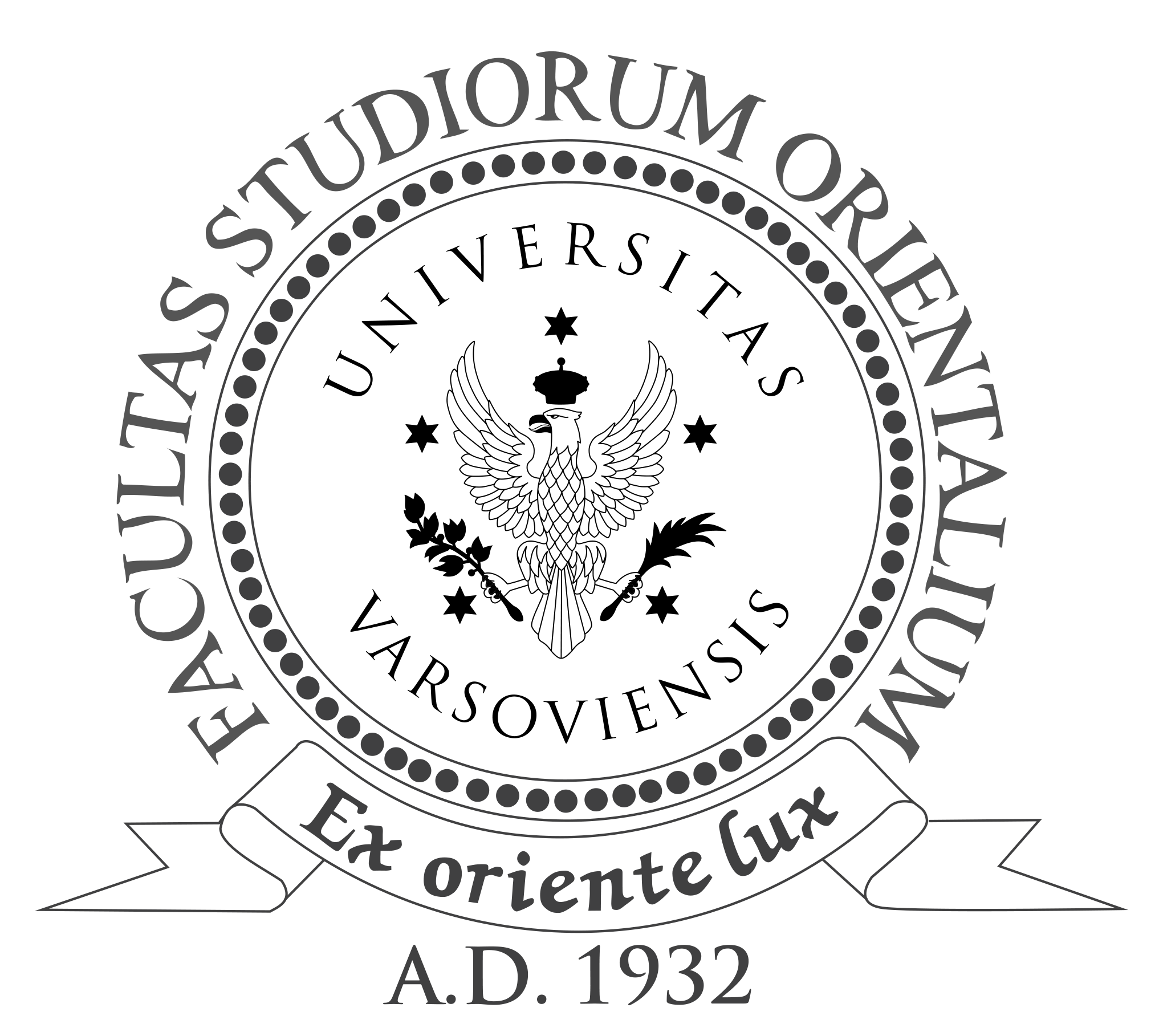PhD Studies – Oriental Studies – Language and Culture

Name of the program: Oriental Studies – Language and Culture
Director of studies: Joanna Jurewicz, Prof. UW dr hab. (48-22-55-20-459, j.jurewicz@uw.edu.pl)
– Domain: domain of humanities
- Discipline: literary studies, linguistics
- Field of study: Oriental studies Specialty:
- Oriental Studies – African Studies
- Oriental Studies – Arabic Studies
- Oriental Studies – Hebrew Studies
- Oriental Studies – Indian Studies
- Oriental Studies – Iranian Studies
- Oriental Studies – Japanese Studies
- Oriental Studies – Culture of Ancient East: Hittitology
- Oriental Studies – Mongolian and Tibetan Studies
- Oriental Studies – Sinology
- Oriental Studies – Turkish Studies
- Eastern Studies
Level and form of study: PhD program Language of instruction: English Duration: 4 years
Tuition fee: 3000 Euro/year
The four-year doctoral program in the Faculty of Oriental Studies at the University of Warsaw provides a unique opportunity in Europe to gain in-depth knowledge of the Orient, while also creating a possibility to acquire the skills of using basic cognitive linguistics tools to examine various aspects of culture and cross-linguistic inter-cultural communication. The program encourages respect for linguistic and cultural variation, and prepares students to be competent experts on a selected Oriental or African culture, with a clear understanding of the challenges and the opportunities stemming from diversity and communication across cultures. Students additionally receive training in research methods and dissemination, selected web-based tools to enhance their academic work, and pedagogical approaches to teaching languages, literatures, and cultures, all of which position the program’s graduates to excel in their research and future career.
Application and admission procedure (for details, see below, par. VI)
In the admission procedure, account is taken of:
- assessment of the research project,
- assessment of academic activity,
- the opinion of the professor recommending a candidate for a doctoral program.
I. Learning outcomes and conditions of attainment
Doctoral students carry out individual academic work under supervision of the professor conducting the doctoral seminar[1]. The effect of individual research under the guidance of the supervisor is the doctoral dissertation. In addition, doctoral students are required to complete the program of study which is a process of education enabling them to attain defined learning outcomes.
The doctoral program includes compulsory courses, optional courses and apprenticeships.
Participation in the doctoral program of study prepares future graduates to research or research and development work, particularly leading to the attainment of learning outcomes in the scope of:
- advanced level knowledge, covering the latest achievements of academic study, of fundamental nature to the domain related to the area of academic research, and also of detailed nature in relation to the field of the conducted academic research;
- skills relating to teaching methods and methodology of the carried out academic research;
- social competencies pertaining to academic and research activities and the social role of an academic scholar.
The doctoral program also offers conditions for academic collaboration in research groups, preparing reviewed academic publications, participation in the life of the academic environment, preparing to doctoral examinations.
| Learning Outcomes | Conditions of Attainment |
| Knowledge | |
|
|
|
|
|
|
| Skills | |
|
|
|
|
|
|
|
|
| Social Competences | |
| understands the special social role of academic study and the need to popularize academic achievements | participation in doctoral seminar, participation in classes in general subjects |
| understands the value of cultural diversity of the world and accepts the rules of behaviour that embrace respect and kindness towards members of other cultures | participation in classes related to the field of study and in 'Methodology of Teaching’ discussion sessions, participation in classes in general subjects |
| is aware of the need to act in accordance with the principles of ethics, and understands the particular responsibility of academic personnel for the future of civilization | participation in doctoral seminar and in 'Methodology of Teaching’ discussion sessions, participation in classes in general subjects |
| can interact and work in a group, acting in different roles, including managerial, and predict the effects of his or her activities | participation in the academic life of the organizational unit of the faculty, work within the received research grants |
II. Minimum course load
Each participant of the doctoral program is required to get a credit in the course of study for at least 310 hours, including:
- 120 hrs of doctoral seminar in the relevant organizational unit of the Faculty of Oriental Studies a doctoral student belongs to
with regard to the professor of the doctoral seminar and the conducted didactic classes
- by the end of the first year of study, 15 hours of classes developing teaching skills of a participant in doctoral studies organized by the University of Warsaw in cooperation with the organizational units of the University of Warsaw, 15 hours of teaching methods course pertaining to the education within the scope of Oriental Studies
- by the end of the second year of study: 120 hours of classes in general subjects organized by the Faculty of Oriental Studies or from the range offered by the University of Warsaw (including 60 hours of introductory course to literary studies/linguistics)
- apprenticeship in the form of conducting didactic classes at the University under the supervision of the director of the doctoral seminar, amounting to 10 hours a year. A participant of the doctoral program employed as an academic teacher is exempt from this form of apprenticeship.
In addition, a student of the doctoral program is required to:
- report (at least two times a year) during the doctoral seminar and in the presence of the professor conducting the seminar on the progress of the doctoral dissertation
- prepare (by publishing or submitting the text for publication) at least one publication by the end of the 3rd year of study.
- participate in the academic life of the Faculty by working for its benefit (participation in research grants, assistance in organizing conferences and seminars etc.).
| Subject | Lecturer | Type of Classes | Duration | Credit |
ECTS credits |
|
| 1st year | Doctoral Seminar | Doctoral Seminar Director | Seminar | 30 hrs | ungraded credit | 4 |
| 1st year | Cognitive analysis of culture [1] | dr hab. Joanna Jurewicz | Proseminar | 60 hrs | ungraded credit | 6 |
| 1st year | Didactics of Higher Education | Lecture | 15 hrs | ungraded credit | 5 | |
| 1st year | Methodology of Teaching | Faculty of Oriental Studies Personnel | Lecture | 15 hrs | ungraded credit | 5 |
| 1st year | Apprenticeships | 10 hrs | ungraded credit | 2 | ||
| TOTAL | 130 | 22 |
| 2nd year | Doctoral Seminar | Doctoral Seminar Director | Seminar | 30 hrs | 4 | |
| 2nd year | Application of Cognitive Linguistics in Cultural Studies (Emotions in Cultures) [2] | dr Monika Nowakowska | Proseminar | 30 hrs | ungraded credit | 3 |
| 2nd year | Application of Cognitive Linguistics in Cultural Studies (Shaping Identity in Cultures) [3] | dr Monika Nowakowska | Proseminar | 30 hrs | ungraded credit | 3 |
| 2nd year | Apprenticeships | 10 hrs | ungraded credit | 2 | ||
| TOTAL | 100 | 12 | ||||
| 3rd year | Doctoral Seminar | Doctoral Seminar Director | Seminar | 30 hrs | ungraded credit | 4 |
| 3rd year | Apprenticeships | 10 hrs | ungraded credit | 2 | ||
| TOTAL | 40 | 6 | ||||
| 4th year | Doctoral Seminar | Doctoral Seminar Director | Seminar | 30 hrs | ungraded credit | 4 |
| 4th year | Apprenticeships | 10 hrs | ungraded credit | 2 | ||
| TOTAL | 40 | 6 |
III. Description of courses
Courses connected with the field of study (optional)
1) Cognitive analysis of culture
The aim of the course is to present the most important assumptions of cognitive linguistics and to show how cognitive linguistics can be used in the cultural studies. During the course the students will discuss the problem of categorization and its cultural grounds. Then the models of the conceptual metonymy, conceptual metaphor and conceptual blending will be discussed together with their application in the analysis of the various aspects of culture (literature, language, philosophy, politics, religion and art).
2) Application of Cognitive Linguistics to Cultural Studies (Emotions in Cultures)
The course takes up the question of metaphorical conceptualizations of the primary human emotions (love, anger, hatred, fear, etc.) as recorded in literature, music and cinema across cultures. The main focus in the analyses will be on multimodal metaphors.
Our aim will be to use in practice the CL means in studying multicultural reality, and particularly, to look first of all at the ways of understanding, experiencing and expressing emotions, and, secondly, to recognize the cultural rooting of those various ways in multicultural and multi-religious contexts. We will start with an exemplifying analysis of this kind based on case studies from the literature and cinematography from the Indian subcontinent (Hindu, Buddhist, Jain, Islam and Christian traditions; many languages and various worldviews), and then, gradually, will move, assuming active participation of the students, to similar analyses of the data collected and presented by the students from cultures best known to and/or studied by them.
3) Application of Cognitive Linguistics to Cultural Studies (Shaping Identity in Cultures)
The course aims at the analysis with the use of the means of CL of the complex processes of construing and supporting of regional vs. supra-regional, religious vs. supra-religious, and local vs. national identities, taking as a starting example the case of building a new national identity by and for the citizens of a young, freshly independent multicultural, multi- linguistic and multi-religious state with particular historical experience.
It will be then expected that students take active part in the seminar, contributing and presenting their own relevant material (from literature, music or cinema) from various cultures. In the analyses we will refer to (with illustrations) and take use of the CL concepts of metonymy and metaphor (including multimodal metaphor), frames and metaphoric frames, image-schemas, mental spaces and conceptual blends.
Obligatory subjects
- Doctoral Seminar
The subject studied under the supervision of the director of the doctoral seminar within the framework of which a doctoral student prepares the doctoral dissertation.
5) Methodology of Teaching
A subject dealing with the specifics of particular cultures and the need to explain them and teach with the emphasis on the incompatibility of terms formulated in the European culture that are employed to describe and analyze the socio-cultural phenomena of the countries of Asia and Africa.
6) Didactics of Higher Education
A course directed at doctoral students as the future academic teachers for whom the knowledge of planning the effective execution of the education process in a higher education institution is a necessary component of their professional competence. Organized by the Faculty of Education.
7) Apprenticeship
Performed by conducting didactic classes at the university under the supervision of the director of the doctoral seminar in the amount of 10 hours annually. A doctoral student gains competence in the scope of applying modern methods and techniques of running didactic classes.
IV. Timetable and detailed rules of participation in the doctoral program
Art. 1
- The assessment of doctoral student’s progress takes place on a year-to-year basis.
- The consecutive years of the doctoral program become completed on the basis of:
- a report containing information on the progress in execution of the doctoral dissertation, publications, conferences and conducted didactic classes together with the opinion of the doctoral seminar director,
- credits collected in the grade book,
- apprenticeships performed in the form of conducting at least 10 hours of didactic classes a year, in the presence of the professor-director of the doctoral seminar;
Art. 2
A student of the program is required to submit annual reports in the Office of the
Doctoral Studies at the Faculty of Oriental Studies within the timeframe given by the director of the program.
The report should contain information about the progress in execution of the doctoral dissertation, participation in conferences, publication of works (together with their copies), number of conducted didactic classes, including those within the required apprenticeship (as certified by the director of the doctoral seminar), number and type of didactic classes taken part in. A written opinion of the professor conducting the doctoral seminar is to be attached to the report.
The signed report and opinion are to be submitted in paper.
Art. 3
- The student of the program who has fulfilled all the conditions to complete a year mentioned in Art. 4 is granted enrolment to another year of study.
- Conditional enrolment to another year of study is granted to a doctoral student who did not fulfil one of the following conditions provided for in the program of study:
- as required by the course of study, did not get a credit for the subjects (maximum two),
- whose progress in execution of the doctoral dissertation was assessed negatively (i.e. obtained less than 40% of max. total points)
- did not prepare at least one publication by the end of the 3rd year of study,
- did not get credit for apprenticeship in the form of conducting didactic classes at the University under the supervision of the director of the doctoral seminar in the amount of 10 hours annually.
- The student of the doctoral program who obtained conditional enrolment is required to execute the unfulfilled tasks in the following year of study. Conditional enrolment may be granted only once during the course of study.
- Obtaining conditional enrolment precludes receiving doctoral scholarship and scholarship for good performance for another year of study.
- The Director of the Doctoral Program removes a participant in the doctoral program from the list of the participants in the doctoral program in the event of failing to meet more than one conditions mentioned in Art. 2 and required by the course of study.
- 2nd year
V. Conditions and procedure of receiving credit
- 1st year
1) obtaining credit for classes:
- Doctoral Seminar (30 hrs)
- Methodology of Teaching (15 hrs)
- Subject connected with the field of study (60 hrs)
- Didactics of Higher Education (15 hrs)
- Apprenticeships (10 hrs)
- obtaining credit for classes:
- Doctoral Seminar (30 hrs)
- Subject connected with the field of study (60 hrs)
- Apprenticeships (10 hrs)
- 3rd year
- obtaining credit for classes:
- Doctoral Seminar (30 hrs)
- Apprenticeships (10 hrs)
- c) preparing (by publishing or submitting the text for publication) at least one publication
- 4th year
- obtaining credit for classes:
- Doctoral Seminar (30 hrs)
- Apprenticeships (10 hrs)
Art. 5
By the end of the 4th year of study, a student of the doctoral program must submit the doctoral dissertation and apply to the Faculty Council for acceptance of the dissertation and for appointment of its reviewers.
VI. Application and admission procedure
On the basis of Art. 9 para 1, item 4 and Art. 12 para 2 of the Terms and Conditions of the Doctoral Program at the University of Warsaw, passed by the Resolution of Senate no. 494 of 18 April 2012 (Monitor Uniwersytetu Warszawskiego No. 4 z. 201, pos. 88), detailed terms and conditions and admission procedure are in force:
Art. 1
Documents for admission:
- Application form the University of Warsaw IRK admission system (open between 25 June and 23 July 2017)
- A. diploma
- Resume/CV
- 3 photos
- Transcript of records
- Proof of English proficiency
- Proof of oriental language proficiency (based on the field of study)
- Research project
- Academic activity
- Opinion of the professor recommending a candidate for a doctoral program (recommendation letters written by faculty members and/or professional colleagues who are in a position to judge your potential for success in the doctoral program, your aptitude for research, and your capacity to make a contribution to your chosen profession. If you were recently a student, faculty members are appropriate. Personal friends and family members are not appropriate recommenders).
- Supervisor’s acceptance letter
Art. 2
In the admission procedure, account is taken of:
- assessment of the research project,
- assessment of academic activity,
- the opinion of the professor recommending a candidate for a doctoral program.
Art. 3
Research project assessment criteria:
- Research project (the size of 2 pages, ca. 4000 characters) is to:
- contain the formulation of a research problem and tentative hypotheses,
- contain brief theoretical introduction with references to the literature of the subject,
- determine the field of study (literary studies/linguistics)
- The subject of the assessment is:
- the clarity of the way the scope of the research is formulated (aim, scope of research, proposed hypotheses),
- justification of the research problem and its place in the existing academic achievements in the given field of research,
- uniqueness of the issues at question and of the methodology of research, correctness of the proposed research methods.
Art. 4
Criteria for academic activity assessment
- Assessment is made on the basis of documents, and in particular, copies of publications or typescripts of texts submitted for publication (together with a proof of receipt from the editor), and proof of active participation in conferences (poster or essay) or research projects.
- Academic activity is evaluated in a scale of 1-5 points.
Art. 5
Candidate Assessment Criteria
- Candidates shall be admitted according to the number of points they score. The maximum number of points is 40, including maximum for:
- research project 20
- academic activity 5
- average overall grade 5
- The necessary condition for being admitted to the program is obtaining at least 50 % of the maximum number of points.
VII. The list of people who are planned to run seminars in English on doctoral program in the academic year 2017/2018.
- Piotr Balcerowicz, Prof. UW dr hab. (Indian Studies)
- Prof. dr hab. Janusz Danecki (Arabian Studies)
- dr hab. Joanna Jurewicz, Prof. UW (Indian Studies)
- dr hab. Irena Kałużyńska, Prof. UW (Sinology)
- dr hab. Marek Mejor (Indian and Buddhist Studies)
- dr hab. Ewa Machut-Mendecka (Arabian Studies)
- dr hab. Nina Pawlak (African Studies)
- dr hab. Shoshana Ronen, Prof. UW (Hebrew Studies)
- dr hab. Jolanta Sierakowska-Dyndo (Iranian Studies)
- dr hab. Danuta Stasik (Indian Studies)
- dr hab. Piotr Taracha (Hittitology)
- dr hab. Leszek Zasztowt (Chair of East-European Studies)
VIII. Academic profile of scholars conducting seminars and courses on doctoral program in English in 2017/2018
Dr hab. Piotr Balcerowicz, Prof. UW, Professor of Philosophy and Oriental Studies (Indian Studies), teaching at the University of Warsaw (the Chair of South Asia, the Faculty of Oriental Studies). He specialises in philosophical traditions of Asia and the West, with
emphasis on South Asian epistemological thought and non-Brahmanic philosophical schools (Jainism, Ajivikism, Buddhism). He also lectures on Indian philosophy and South Asian religions as well as on intercultural relations and contemporary history of Asia. Till 2011 Professor of International Relations at the University of Social Sciences and Humanities (Department of International Relations), Warsaw, and member of the Committee for Oriental Studies of Polish Academy of Sciences. He publishes extensively on Indian philosophy, epistemology and religions. His main books include: (1) Jaina Epistemology In Historical And Comparative Perspective. Volume I & II, Stuttgart 2001 (reprinted: Delhi 2008). (2) Afghanistan: History – people – politics, Warsaw 2001 (in Polish). (3) Jainism – An Ancient Indian Religion. History, Ritual, Literature, Warsaw
2003 (in Polish). (4) History of Classical Indian Philosophy. Part One: Beginnings, Analytical Trends i Philosophy of Nature, Warsaw 2003 (in Polish), (5) Jainism and the Definition of Religion (Mumbai 2009), (6) Logic and Belief in Indian Philosophy (ed., Delhi 2010), (7) Art, Myths and Visual Culture of South Asia (ed., Delhi 2011), (8) World View and Theory in Indian Philosophy (ed., Delhi 2012), (9) Encyclopedia of Indian Philosophies, Vol. 14: Jaina Philosophy, Part II (ed., Delhi 2013). For more information: www.orient.uw.edu.pl/balcerowicz/me.htm.
Prof. dr hab. Janusz Danecki teaches Arabic language and Islamic Culture in the Department of Arabic and Islamic Studies, Oriental Faculty at the University of Warsaw. He specializes in Arabic linguistics and Islam, especially Islam in the Arab World. He is the editor of the international journal “Studia Arabistyczne i Islamistyczne” (Arabic and Islamic Studies). J. Danecki is the author of a number of essential works on the Arabic language and Islam (Arabic Grammar, Arabic-Polish Dictionary, Introduction to Islam, Political Thought in Islam) . He also translated into Polish a number of essential books of classical and modern Arabic literature (i.a. Ibn Hazm, the Mu’allaqat, Al-Hamadhani’s Maqamat; G. Kanafani, Yusuf Idris, Tawfiq al-Hakim).
Dr hab. Joanna Jurewicz, Prof. UW, is a professor at the Oriental Studies Department of Warsaw University. In her research, she uses the interdisciplinary methodology of philology and cognitive linguistics to analyze ancient Indian texts (Vedic texts and philosophical parts of the Mahabharata, especially the Bhagavadgita and the Mokshadharmaparvan) and religious and cultural aspects of Hindu tradition. Author of three books and over 50 papers. For her latest book, Fire and Cognition in the Rgveda (Warszawa 2010), she got the Prime Minister Award for the Outstanding Scholar Achievement (2011). She is a member of the Academia Europaea, vice-president of Polish Semiotics Society and vice-secretary of Warsaw Society of Science. For more details see: https://uw.academia.edu/JoannaJurewicz.
Dr hab. Irena Kałużyńska, Prof. UW, holds the position of professor in the Sinology Department of the Faculty of Oriental Studies, University of Warsaw. Her research interests are Chinese linguistics and culture, especially Chinese onomastics. She has published two monographs and many academic papers mainly on Chinese toponymy and anthroponymy. She has also translated several pieces of classical and modern Chinese literature and a number of books on Chinese culture and history.
Prof. dr hab. Marek Mejor, professor at the Faculty of Oriental Studies, University of Warsaw; head of the Research Centre of Buddhist Studies; special fields of interest: Sanskrit, Buddhist studies (Sanskrit, Pali, Tibetan), Indo-Tibetan studies, history of Indian Studies. Studied in Warsaw, Oxford, Hamburg, Tokyo; cofounder of the journal „Studia Indologiczne” (Journal of Indological Studies); chairman of the Committee of Oriental Studies of the Polish Academy of Sciences; vice-president of the Polish Oriental Society; author of books and papers on Sanskrit and Buddhist studies.
Dr hab. Agata S. Nalborczyk, Prof. UW, M.A. in Iranian studies, Ph. D. in Arabic and Islamic Studies, habilitated Dr. in Religious Studies – Islamic Studies, Ass. Professor at the Department for European Islam Studies, Faculty of Oriental Studies, University of Warsaw. Her research focuses on Islam in Europe (esp. Poland, Central and Eastern
Europe), legal status of European Muslim minorities, Polish-Lithuanian Tatars, gender issues in Islam, Christian-Muslim relations, the image of Islam and Muslims in Europe, Arabic sociolinguistics, Arabic grammatical theory. She is the member of the Editorial Board of the series “Annotated Legal Documents on Islam in Europe” (Leiden: Brill; first volume published in 2014), editorial advisor and author in the “Yearbook of Muslims in Europe” ed. by Jørgen S. Nielsen et. al. (Leiden: Brill vol.1-5 2009-2013). Author of numerous articles on Islam in Europe published in incl. “Islam and Christian-Muslim Relations” “Global Change, Peace and Security”, “Islamochristiana”, “TRANS” and edited volumes.She is a member of the Association for the Sociology of Religion and of the International Study of Religion in Eastern and Central Europe Association (ISORECEA). Some recent publications include: 2) Poland (with Stanisław Grodź) [in:] J. S. Nielsen, S. Akgönül, A. Alibašić, E. Račius (ed.), Yearbook of Muslims in Europe, vol. 5, Brill, Leiden 2013, pp. 501-515; 3); Islamic organizations in Poland: From monopoly to pluralism (with Monika Ryszewska) [in] M. Kortmann, K. Rosenow-Williams (ed.), Islamic organizations in Europe and the USA. A multidisciplinary perspective, Palgrave Macmillan, Basingstoke- New York 2013, pp. 13-36; 4) The political participation of Polish Muslim Tatars – the result of or the reason for integration? From Teutonic wars to the Danish cartoons affair [in] J. S. Nielsen (ed.), Muslim Political Participation in Europe, Edinburgh University Press, Edinburgh 2013, pp. 239-254.
Dr Monika Nowakowska, Ph. D., is an assistant professor at the Chair of South Asian Studies of the Faculty of Oriental Studies in the University of Warsaw. The graduate and postgraduate from the Faculty, the holder of scholarship from the Government of India, Michael Coulson Junior Research Fellow of the Wolfson College, University of Oxford. She teaches Sanskrit and sometimes Hindi, studies and researches the classical Indian philosophical thought (the author of a PhD thesis on some epistemological aspects in the 9th century Sanskrit treatise by Jayanta Bhatta), especially in the context of the role and function of the language in culture. She also translates belletristic and philosophical literature.
Prof. dr hab. Nina Pawlak, is a professor of African linguistics, member of the Department of African Languages and Cultures, University of Warsaw. Her academic interests focus on Hausa, in comparative perspective they also cover other Chadic languages. The main fields of linguistic investigation are typology, language development, cognitive linguistics, culture and communication. http://www.afrykanistyka.uw.edu.pl/ staff/nina-pawlak-3
Shoshana Ronen – CV
Prof. dr hab. Shoshana Ronen is a professor at the University of Warsaw and the head of the Hebrew Studies Department. She is the author of In Pursuit of the Void: Journeys to Poland in Contemporary Israeli Literature (2001); Nietzsche and Wittgenstein: In Search of Secular Salvation, (2002); Polin – A Land of Forests and Rivers: Images of Poland and Poles in Contemporary Hebrew Literature in Israel (2007), and A Prophet of Consolation on the Threshold of Destruction: Yehoshua Oziasz Thon, an Intellectual Portrait, (2015). She is the co-editor of Polish and Hebrew Literature and National Identity and A Romantic Polish-Jew: Rabbi Ozjasz Thon from Various Perspectives (2015). She is interested in modern Hebrew literature, Jewish thought, and modern philosophy. Particularly she is dealing with questions like: The Holocaust in Hebrew literature; memory, identity and nationhood in modern Hebrew literature; Hebrew literature in the
Polish land; Jewish philosophical and theological thinking after Auschwitz, and women in Judaism.
Prof. dr hab. Danuta Stasik (Indian Studies): Danuta Stasik is Professor of Hindi language and literature at the Faculty of Oriental Studies at the University of Warsaw. Her main research interests are history of Hindi literature and literary criticism, the Rāmāyaṇa tradition, Rāmbhakti in North India and the Indian diaspora in the West, particularly as represented in Hindi writing. She is the author of more than 60 research papers and articles in different books and journals in English, Polish and Hindi. Her books include The Infinite Story. The Past and Present of the Rāmāyaṇa Tradition in Hindi Literature (2009), Out of India. Image of the West in Hindi Literature (1994), a grammar of the Hindi language in Polish (1st published in 1998), a textbook of Hindi in Polish in two parts (1st published in 1994 and 1997) and a bilingual collection – Polish translations with Hindi originals – of Kunwar Narain’s poems (2013). For more details see: https:// uw.academia.edu/danutastasik
Prof. dr hab. Piotr Taracha (born 1960), Dean of the Faculty of Oriental Studies, is a professor of Hittitology at the Department of Near Eastern Studies of the University of Warsaw. He is also half-time Professor of Aegean Archaeology at the Institute of Archaeology and Ethnology, Polish Academy of Sciences. His PhD thesis (1993) concerned weaponry and the system of fighting in the Late Bronze Age Aegean; his habilitation monograph (2000) was Ersetzen und Entsühnen: Das mittelhethitische Ersatzritual für den Großkönig Tuthalija (CTH *448.4) und verwandte Texte, Leiden: Brill. Professor of Humanities, the title acknowledged by the President of Poland in 2010. His publications, including two books and over 80 papers and essays, cover a wide range of topics concerning Hittite and other languages of ancient Anatolia, Hittite religion, magic, literature, and history, as well as Anatolian and Aegean archaeology.
His teaching experience at the University of Warsaw (since 1993) includes lectures and seminars in: Hittite, archaeology of the ancient Near East, general information on the Middle East, and the history of Anatolia. He was a supervisor of 10 MA theses and 3 PhD dissertations (4 PhD dissertations in progress). He delivered lectures abroad as a visiting professor at: Altorientalisches Seminar, Free University Berlin (1993-1999), Altorientalisches Seminar, University in Tübingen (1994-1995), Altorientalisches Seminar, University in München (2004), Institut für Ägyptologie und Altorientalistik, University in Mainz (2004, 2010, 2012, 2014), Institut für Altorientalistik, University of Würzburg
(2013)
[1] A professor conducting a doctoral seminar is the professor of the seminar a doctoral student enroled to (before starting the doctoral program) and at the same time, the supervisor of the doctoral dissertation (after the program has been started)
[2] or classes chosen from the range of Oriental Studies/University of Warsaw offer, corresponding to the interests of a doctoral student
[3] or classes chosen from the range of Oriental Studies/University of Warsaw offer, corresponding to the interests of a doctoral student
[4] or classes chosen from the range of Oriental Studies/University of Warsaw offer, corresponding to the interests of a doctoral student
[5] or classes chosen from the range of Oriental Studies/University of Warsaw offer, corresponding to the interests of a doctoral student
[6] or classes chosen from the range of Oriental Studies/University of Warsaw offer, corresponding to the interests of a doctoral student






